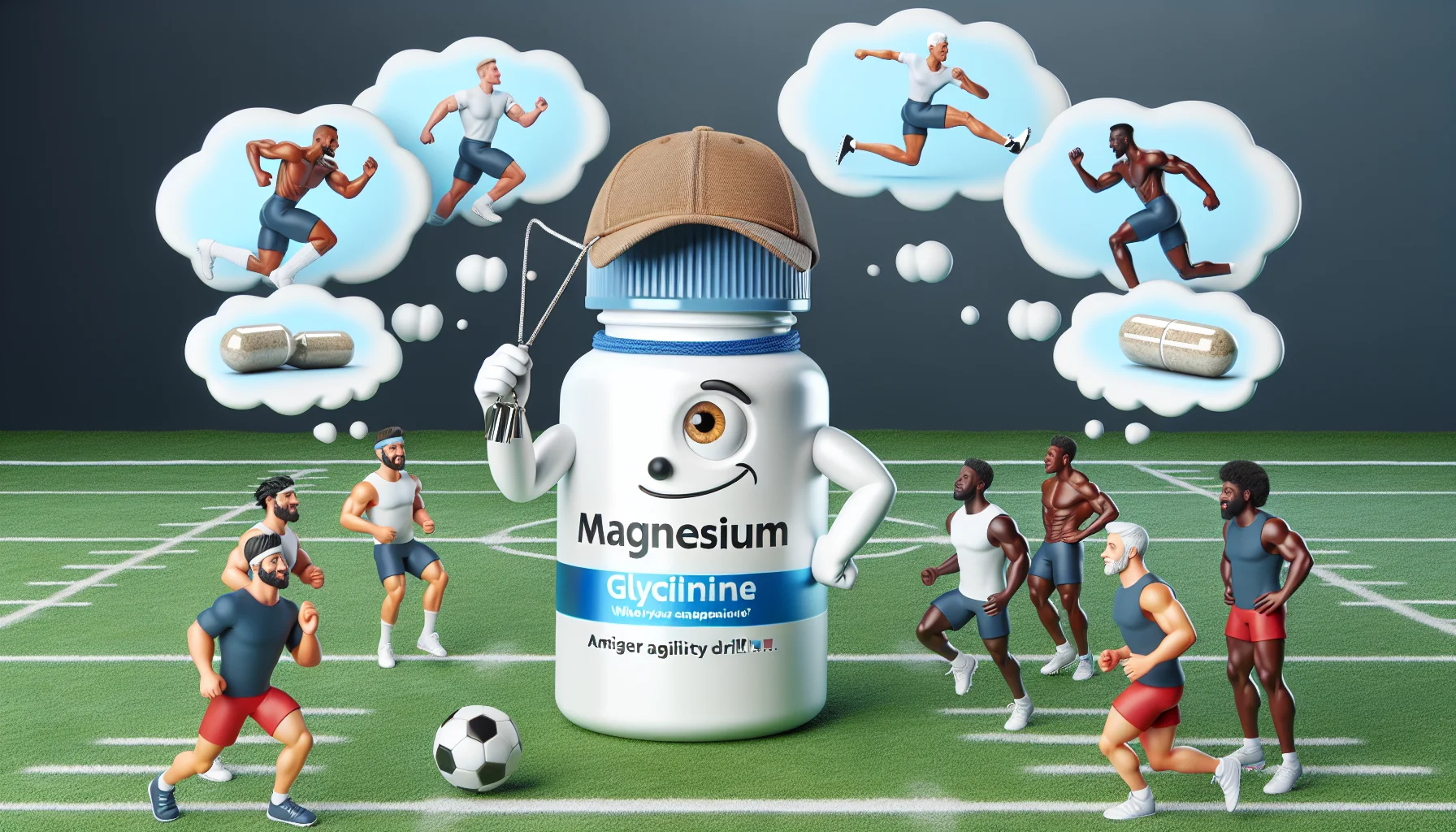Calm magnesium glycinate Quiz
Test Your Knowledge
Question of
The Benefits of Calm Magnesium Glycinate for Athletes
Magnesium glycinate is a crucial component in sports nutrition, offering significant benefits for athletes. This particular form of magnesium is known for its high bioavailability, meaning it's more easily absorbed by the body compared to other forms. It plays a vital role in muscle recovery and relaxation, which is essential for athletes who undergo intense training and competitions. Magnesium glycinate helps in reducing muscle cramps and soreness, allowing for quicker recovery times and improved performance. Furthermore, it supports better sleep quality and stress management, both of which are critical for optimal athletic performance. Incorporating magnesium glycinate into an athlete's diet can thus be a game-changer, contributing to both physical and mental well-being.
What is Calm Magnesium Glycinate?
Calm Magnesium Glycinate is a specialized formulation designed to provide an efficient and gentle way to increase magnesium levels in the body. Unlike other forms of magnesium, magnesium glycinate is bound to glycine, an amino acid that not only facilitates the absorption of magnesium but also has a calming effect on the brain. This unique combination makes it highly bioavailable and less likely to cause laxative effects, a common issue with other magnesium supplements such as magnesium oxide. The benefits of Calm Magnesium Glycinate include supporting muscle and nerve function, promoting relaxation and better sleep, and contributing to bone health. Its enhanced absorbability and minimal gastrointestinal side effects make it an ideal choice for those looking to improve their magnesium intake without discomfort.
How Calm Magnesium Glycinate Supports Athletic Performance
- Improved sleep quality
- Enhanced muscle function
- Reduced cramping for athletes
Optimal Dosage and Timing for Athletes
For athletes looking to improve their recovery, sleep quality, and overall performance, incorporating calm magnesium glycinate into their routine can be beneficial. The recommended dosage typically ranges from 200 to 350 mg per day, depending on individual needs and tolerance levels. It is crucial for athletes to start with a lower dose and gradually increase to find their optimal amount. Timing also plays a significant role in maximizing the benefits of magnesium glycinate. Taking it post-workout can help reduce muscle soreness and aid in recovery, while consuming it 30 to 60 minutes before sleep may improve sleep quality, allowing for better rest and recovery. Athletes should consider their training schedules and personal response to magnesium to determine the best timing for their needs.
Comparing Magnesium Supplements
| Magnesium Supplement | Absorption Rate | Benefits | Side Effects |
|---|---|---|---|
| Calm Magnesium Glycinate | High | Supports relaxation, better sleep, muscle recovery | Less likely to cause laxative effect |
| Magnesium Citrate | Medium to High | Supports metabolism, constipation relief | Can cause stomach upset and diarrhea at high doses |
| Magnesium Oxide | Low | Relieves constipation, migraines | More likely to cause gastrointestinal issues |
| Magnesium Chloride | Medium | Improves digestion, kidney function | May include stomach upset, diarrhea |
| Magnesium Sulfate | Low to Medium | Detoxification, temporary relief for constipation | Can lead to dehydration, imbalance in electrolytes if overused |
User Experiences with Calm Magnesium Glycinate
Many athletes have reported significant improvements in their training and recovery processes after incorporating calm magnesium glycinate into their routines. One common theme is the enhancement of sleep quality. Athletes have noted that taking this supplement has allowed them to fall asleep more easily and experience deeper, more restorative sleep. This, in turn, has had a positive impact on their recovery times, enabling them to return to training with greater energy and reduced muscle soreness.
Another benefit frequently mentioned is the supplement's role in reducing muscle cramps and tension. Athletes, especially those engaged in high-intensity sports, have found that calm magnesium glycinate helps to alleviate muscle tightness and cramps, which can often hinder performance and prolong recovery periods. This has allowed them to maintain a more consistent training schedule without being sidelined by preventable muscle issues.
Furthermore, the mental aspect of sports performance has also been positively affected. Athletes report feeling more relaxed and less anxious, which they attribute to the calming effects of magnesium. This mental clarity and reduced stress level have enabled them to focus better during competitions and training, leading to improved performance outcomes.
In summary, the testimonials from athletes who have used calm magnesium glycinate highlight its beneficial impact on both physical and mental aspects of training and recovery. From better sleep and reduced muscle soreness to enhanced mental focus, it's clear that this supplement has become a valuable component of many athletes' nutritional regimens.
Incorporating Calm Magnesium Glycinate into Your Training Regimen
- Begin by understanding your current magnesium levels. Consider getting a blood test to see if you're deficient or on the lower end of the recommended magnesium levels.
- Research the benefits of magnesium glycinate, especially how it differs from other forms of magnesium in terms of absorption and effects on muscle relaxation and recovery.
- Consult with a healthcare professional to ensure that adding magnesium glycinate to your regimen is safe and appropriate for your specific health profile and athletic goals.
- Start with a lower dose to assess your body’s tolerance and gradually increase to the recommended dose as suggested by the manufacturer or your healthcare provider.
- Incorporate magnesium-rich foods into your diet, such as spinach, nuts, and whole grains, to naturally boost your magnesium intake alongside supplementation.
- Monitor your body’s response to magnesium glycinate, including any improvements in muscle recovery, sleep quality, and overall stress levels.
- Adjust your dosage as necessary, in consultation with a healthcare professional, to find the optimal amount that supports your training needs without causing any adverse effects.












